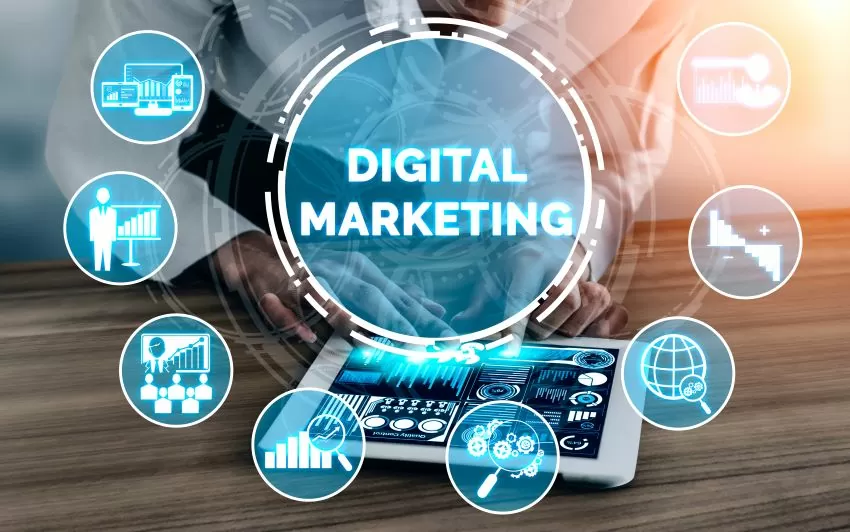The Importance of Digital Marketing in
Today’s Business Landscape
In a world that’s increasingly connected and technology-driven, digital marketing has evolved from being an optional strategy to an essential part of every business’s success. Whether you’re running a small local shop or managing a global brand, reaching your audience through digital channels is no longer a luxury—it’s a necessity.
In this blog post, we’ll explore what digital marketing is, why it’s important, and how it can help your business grow, connect, and thrive in the modern market.

What Is Digital Marketing?
Digital marketing refers to the promotion of products or services using digital channels such as websites, social media, search engines, email, and mobile apps. It encompasses a variety of strategies, including:
Search Engine Optimization (SEO)
Social Media Marketing (SMM)
Content Marketing
Email Marketing
Pay-Per-Click Advertising (PPC)
Affiliate Marketing
Influencer Marketing
Online PR and more
These tools allow businesses to communicate directly with their target audience, gather data, and measure performance in real time.
Why Digital Marketing Matters
1. Wider Reach and Accessibility
Traditional marketing (TV, radio, print) has limitations when it comes to targeting and reach. Digital marketing, on the other hand, allows businesses to reach a global audience 24/7. Whether your customer is across the street or across the world, digital marketing helps you connect with them instantly.
With billions of people online every day, the potential to increase visibility and brand awareness is enormous.
2. Cost-Effective and High ROI
Compared to traditional methods, digital marketing is often more affordable and delivers higher returns. Small businesses can launch targeted campaigns on platforms like Facebook or Google with minimal budgets and still achieve meaningful results.
Plus, digital channels allow you to track spending and ROI more precisely. You can analyze performance, optimize in real-time, and reduce waste—something print ads or billboards can’t offer.
3. Precise Targeting
One of the most powerful advantages of digital marketing is the ability to target specific audiences based on behavior, interests, location, demographics, and more.
Want to target 25-35-year-old tech enthusiasts in New York who recently searched for smartphones? You can do that—with digital advertising platforms like Facebook Ads or Google Ads.
This kind of targeting helps ensure your message reaches the right people at the right time, increasing the chances of conversion.
4. Data-Driven Decision Making
Digital marketing gives you access to real-time data and analytics that help you understand what’s working—and what’s not.
With tools like Google Analytics, email tracking, and social media insights, you can monitor key metrics such as:
Website traffic
Bounce rates
Conversion rates
Ad performance
Audience behavior
This allows you to make informed, strategic decisions instead of relying on guesswork.
5. Improved Customer Engagement
Digital marketing opens up two-way communication with your audience. Through social media, live chat, comment sections, or email, businesses can interact directly with customers—answering questions, addressing concerns, and building relationships.
This consistent engagement increases customer loyalty and can turn one-time buyers into brand advocates.
6. Personalization and Customization
Modern consumers expect personalized experiences. Digital marketing allows you to tailor content and offers based on user behavior, preferences, and interactions.
For example, email marketing tools can segment your audience and send personalized emails based on user interests, purchase history, or location. This kind of customization improves user experience and boosts conversion rates.
7. Competitive Advantage
Chances are, your competitors are already investing in digital marketing. If you’re not, you’re giving them an edge.
Staying up-to-date with the latest trends, tools, and technologies ensures your brand stays relevant and competitive. Whether it’s ranking higher on Google or engaging followers on Instagram, digital marketing helps level the playing field—no matter your business size.
8. Measurable Results and ROI
One of the key frustrations with traditional marketing is the lack of measurable outcomes. With digital marketing, you can track every dollar spent and every action taken.
You can answer questions like:
How many people clicked on my ad?
How many users signed up for my newsletter?
Which social media platform drives the most sales?
This transparency allows you to refine strategies and maximize your return on investment (ROI).
